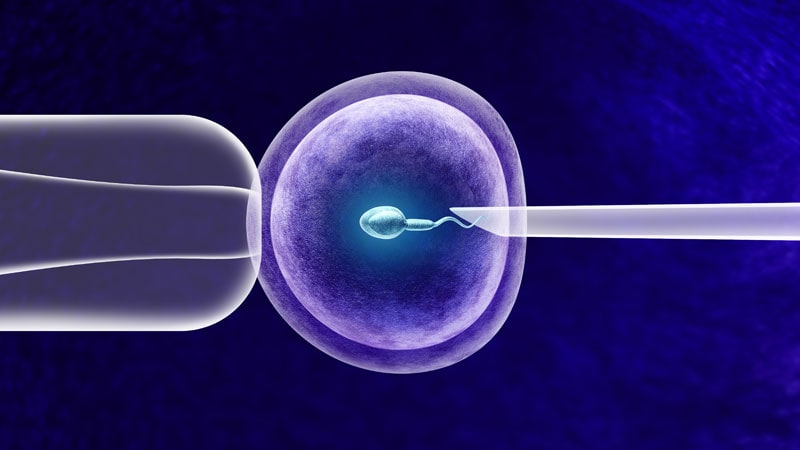[ad_1]
Fresh embryo transfer may be better than a freeze-all strategy for women who have a lower prognosis for in vitro fertilization (IVF) treatment success, according to new data published in The BMJ.
Daimin Wei, MD, with the State Key Laboratory of Reproductive Medicine and Offspring Health, at Shandong University in Jinan, China, led the study that included 838 women with a low prognosis for IVF treatment success. Low prognosis was defined as nine or fewer oocytes retrieved or poor ovarian reserve (antral follicle count
The women eligible were randomized 1:1 either to the frozen embryo transfer group, where all embryos were cryopreserved and the frozen embryo transfer happened later in subsequent menstrual cycles or the fresh embryo transfer group, where women underwent fresh embryo transfer after oocyte retrieval.
Live Birth Rate Lower in Freeze-All Group
In an intention-to-treat analysis, the live birth rate, the primary endpoint, was lower in the freeze-all group than in the fresh embryo transfer group (32% vs 40%; relative ratio, 0.79; 95% CI, 0.65-0.94; P = .009).
Secondary outcomes were clinical pregnancy, singleton or twin pregnancy, pregnancy loss, ectopic pregnancy, birth weight, maternal and neonatal complications, and cumulative live birth after embryo transfers within a year of randomization.
The frozen embryo group had a lower rate of clinical pregnancy than the fresh transfer group (39% vs 47%). The cumulative live birth rate was lower in the frozen embryo group compared with the fresh transfer group (44% vs 51%).
Numbers of Women With Poor Prognosis for IVF Increasing
The number of women who undergo IVF with low odds of success has been increasing and strategies to improve the chance for live birth in these women are lacking, the authors wrote.
In women with good prognosis for live birth, transferring frozen embryos increases the chance of live birth compared with a fresh embryo transfer, and this method is widely used in women with low prognosis, the authors explained. But there had been little study as to whether women with low prognosis could benefit from freezing all embryos before transfer.
Future work, the authors wrote, should explore clinical characteristics and biomarkers in blood or the endometrium that could accurately predict the best transfer strategy for women using IVF.
“Further studies are warranted to explore the optimal number and stage of embryos for fresh transfer in women with low prognosis for IVF to have a singleton pregnancy,” they wrote.
Broader Implications for Advanced IVF Treatments
In an accompanying editorial, Simone Cornelisse, MD, with the Department of Obstetrics and Gynaecology, Radboud University Medical Centre in Nijmegen, the Netherlands, and Sebastiaan Mastenbroek, PhD, a clinical embryologist with Amsterdam University Medical Center and the University of Amsterdam, Centre for Reproductive Medicine, Amsterdam, the Netherlands, write that the study authors offer important insights for women with poor IVF prognosis as most studies examining the freeze-all method have focused on woman with a good prognosis.
They add that the findings have broader implications, particularly concerning advanced IVF treatments such as pre-implantation genetic testing for aneuploidy or embryo banking, which involves freezing embryos from several IVF cycles before a first transfer.
“These strategies include freezing of all embryos and are often offered to women with a poor prognosis, such as those of advanced maternal age, to address declining oocyte quality and numbers,” the editorialists wrote.
However, both strategies are controversial, they note, as there is little evidence backing their efficacy. But the current study suggests that the freeze-all method in these contexts may not benefit these women.
“Rigorous evaluation of these strategies is needed,” the editorialists write. “Any potential advantages must outweigh drawbacks, such as the lower cumulative live birth rates linked to skipping a fresh embryo transfer.”
Coauthor Richard S. Legro, MD, reports consulting for Organon, Celmatix, and Exeltis. The authors reported no other relevant financial relationships. The editorialists reported no relevant financial relationships.
Marcia Frellick is an independent Chicago-based healthcare journalist.
[ad_2]
Source link : https://www.medscape.com/viewarticle/fresh-embryo-transfer-may-be-best-option-women-low-ivf-odds-2025a10003bj?src=rss
Author :
Publish date : 2025-02-10 11:11:23
Copyright for syndicated content belongs to the linked Source.
